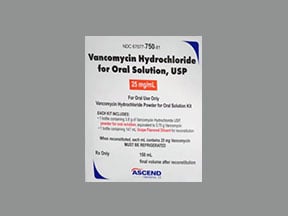
Vancomycin Coupons & Savings Card – Discount Prices from $34.81
Generic for: Vancocin, Firvanq, Vancomycin+syrspend sf
My prescription
Edit
150ML of 25MG/ML, Vancomycin (1 Bottle)
Select pharmacy

CVS
$39.21
COUPON PRICE
Walgreens
$34.81
COUPON PRICE
Albertsons
$54.95
COUPON PRICE
Walmart
$67.73
COUPON PRICEVancomycin savings card
Show this card to your pharmacist
Walgreens
$34.81
BIN
ID
PCN
GRP
011867
LHED37557A
HT
LABH001
Powered by
More prescriptions for skin infection
More prescriptions for skin infection
Price history for Firvanq (brand) & Vancomycin (generic)
1 Bottle, 150ML of 25MG/ML
Average retail price for Firvanq
Average retail price for Vancomycin
Average SaveHealth price for Vancomycin
Our price history data is based on aggregated prescription data collected from participating pharmacies in America. Our prescription data updates daily to reflect the latest price changes. If you notice a missing data point, it means there wasn't sufficient data available to generate a monetary value for that date.
We analyzed Vancomycin prices for (150ML of 25MG/ML, 1 Bottle) over the last 12 months. The average retail price was $208.80, while the average price using the SaveHealth discount card was $45.02. That's a savings of approximately 78.44% when using our Vancomycin coupon.
Compared to the generic version, Firvanq had an average price of $117.67 over the same time period. With the SaveHealth savings card, Vancomycin is 61.74% cheaper on average than Firvanq.
*Retail prices are based on pharmacy claims data, and may not be accurate when we don't have enough claims.
Vancomycin dosage forms
Dosage Quantity Price from Per unit 150ML of 25MG/ML 1 Bottle $39.21 $39.21 150ML of 25MG/ML 2 Bottles $60.12 $30.06 150ML of 25MG/ML 3 Bottles $81.03 $27.01 150ML of 50MG/ML 1 Bottle $105.98 $105.98 150ML of 50MG/ML 2 Bottles $196.96 $98.48 150ML of 50MG/ML 3 Bottles $287.93 $95.98 150ML of 250MG/5ML 1 Bottle $105.98 $105.98 150ML of 250MG/5ML 2 Bottles $196.96 $98.48 150ML of 250MG/5ML 3 Bottles $287.93 $95.98
| Dosage | Quantity | Price from | Per unit |
|---|---|---|---|
| 150ML of 25MG/ML | 1 Bottle | $39.21 | $39.21 |
| 150ML of 25MG/ML | 2 Bottles | $60.12 | $30.06 |
| 150ML of 25MG/ML | 3 Bottles | $81.03 | $27.01 |
| 150ML of 50MG/ML | 1 Bottle | $105.98 | $105.98 |
| 150ML of 50MG/ML | 2 Bottles | $196.96 | $98.48 |
| 150ML of 50MG/ML | 3 Bottles | $287.93 | $95.98 |
| 150ML of 250MG/5ML | 1 Bottle | $105.98 | $105.98 |
| 150ML of 250MG/5ML | 2 Bottles | $196.96 | $98.48 |
| 150ML of 250MG/5ML | 3 Bottles | $287.93 | $95.98 |
